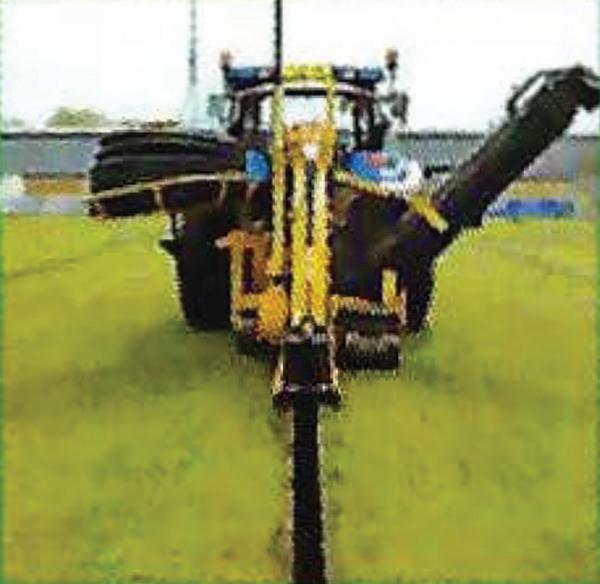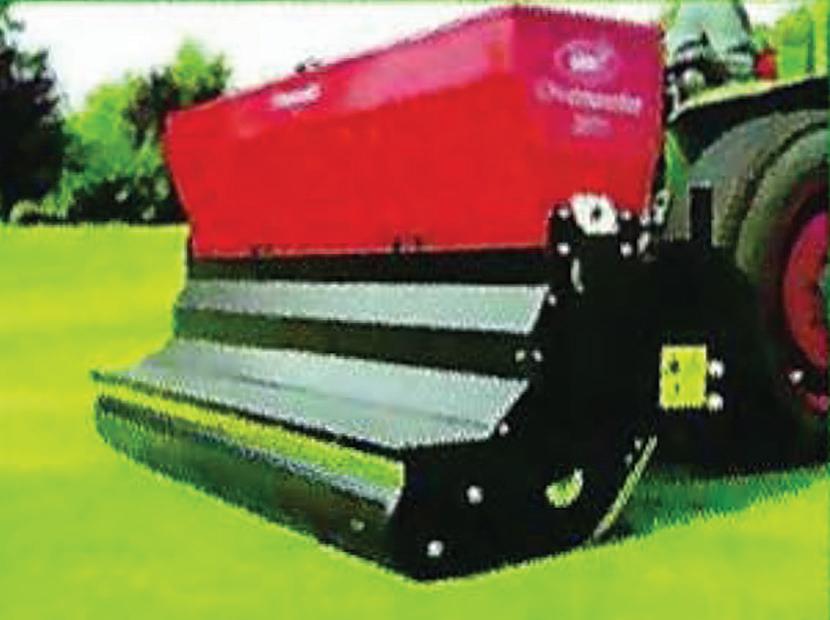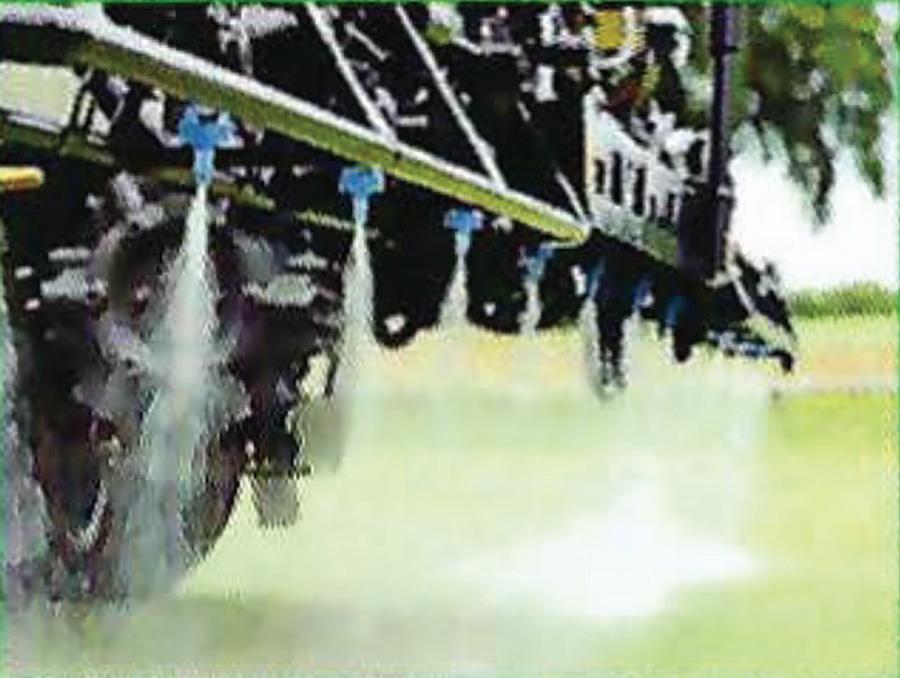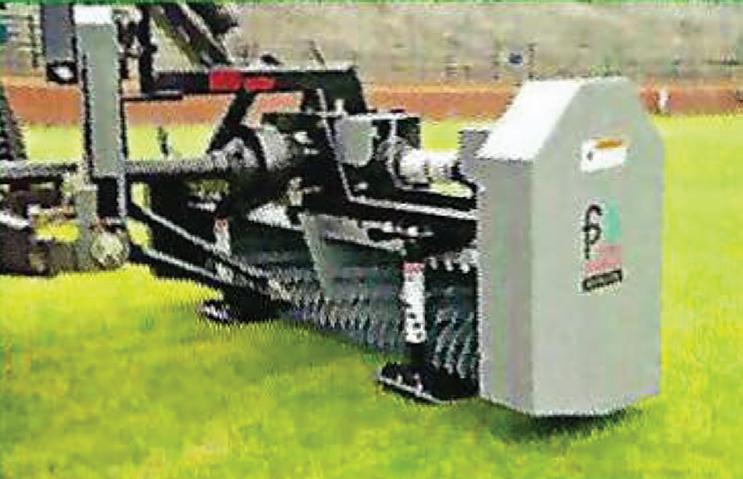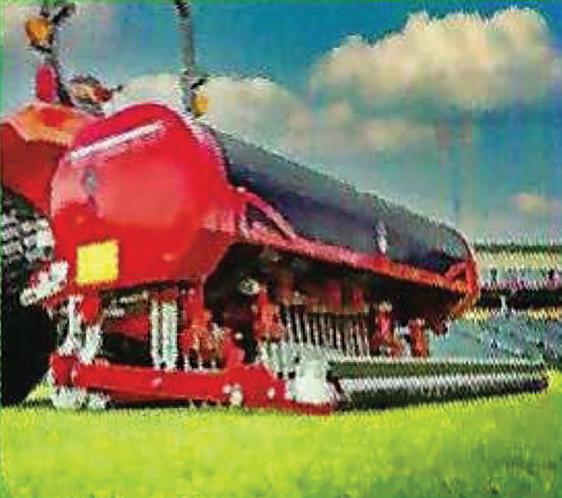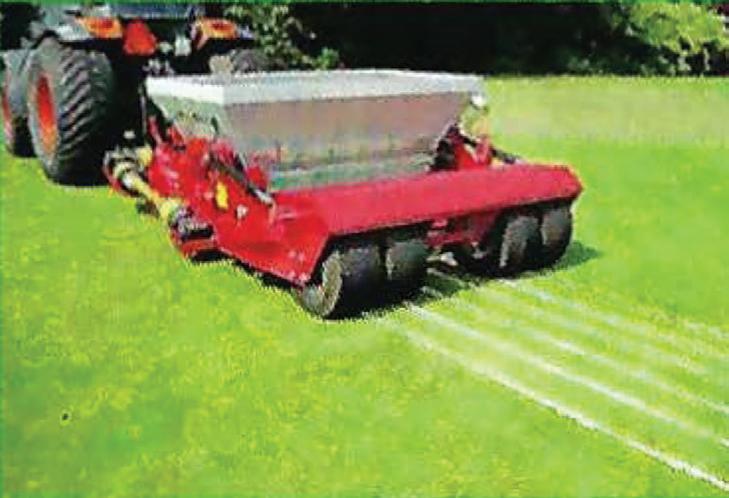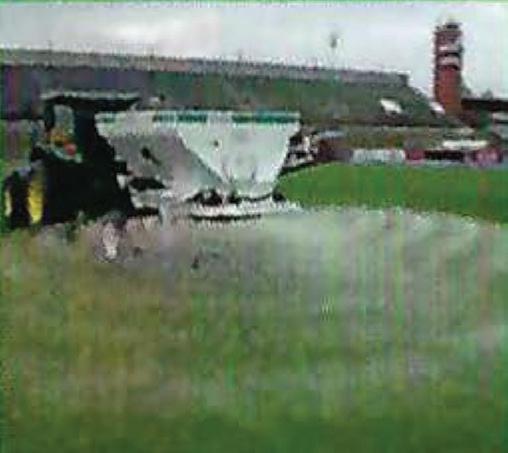






For nearly 30 years, POLYON® controlled-release fertilizer has been used with confidence for its predictable performance and labor-saving benefits. Industry proven, trusted by sports turf managers everywhere. If your goal is safe, durable and beautifully playable turf – season in and season out – no fertilizer feeds your success like POLYON® fertilizer. Choose POLYON® fertilizer and you will get guaranteed results backed by our POLYON® Guarantee.

For more information, visit www.harrells.com/polyon or contact your Territory Manager today!
CHUCK BRAMHALL CAPE COD cbramhall@harrells.com
(508) 400-0600
JIM COHEN EASTERN MA & ME jcohen@harrells.com
(978) 337-0222
MIKE DUKETTE CT mdukette@harrells.com
(860) 930-8888
JIM FAVREAU MASSACHUSETTS jfavreau@harrells.com
(978) 227-2785
MIKE KROIAN RI, MA mkroian@harrells.com

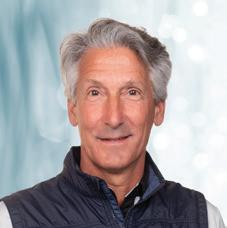

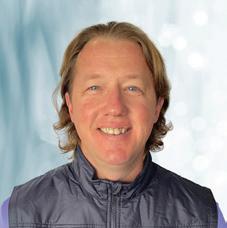
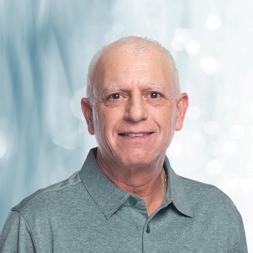

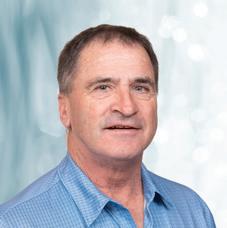


(401) 265-5353
TOM HOFFER NORTHEAST thoffer@Harrells.com
(401) 871-2916
JIM WIERZBICKI CT, RI
jwierzbicki@harrells.com
(860) 424-7250
KENT LEMME WESTERN MASS klemme@harrells.com
(413) 281-8087
CONNOR CINQUE NH, ME ccinque@harrells.com
(603) 930-1861
CUSTOMIZABLE RATES that fit into any spray program
OPTIMIZED IRRIGATION EFFICIENCY to maximize water inputs
ENHANCED DELIVERY of nutrients and control products into the root zone
TRUSTED CASCADE ™ PERFORMANCE
Introducing Cascade Tre™ to our family of innovative soil surfactants. Delivering the same trusted performance you’ve relied on from the Cascade™ brand, Cascade Tre offers improved safety features allowing customization of your irrigation schedule. Increased formulation flexibility provides customizable rates and enhanced turf safety after delayed watering, maximizing your time and course playability.
Learn more on our website
IMPROVED BIOTIC STRESS RESISTANCE with uniform and balanced root zone hydration



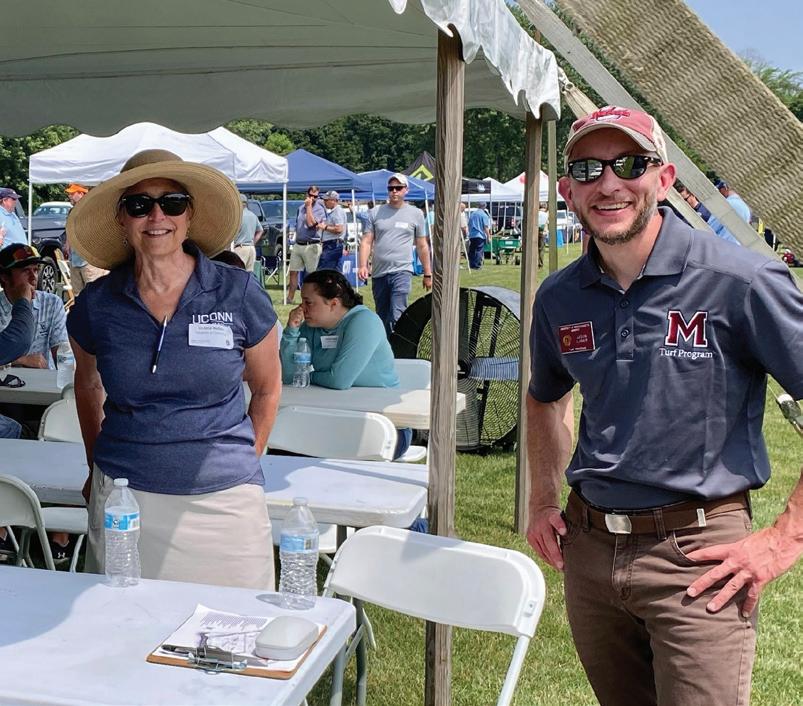
12 Brendon Connor
14 UMass Turf Day
16 Perennial Ryegrass on Athletic Fields
18 BMP Case Study: Fraise Mowing for Weed Control on Athletic Fields
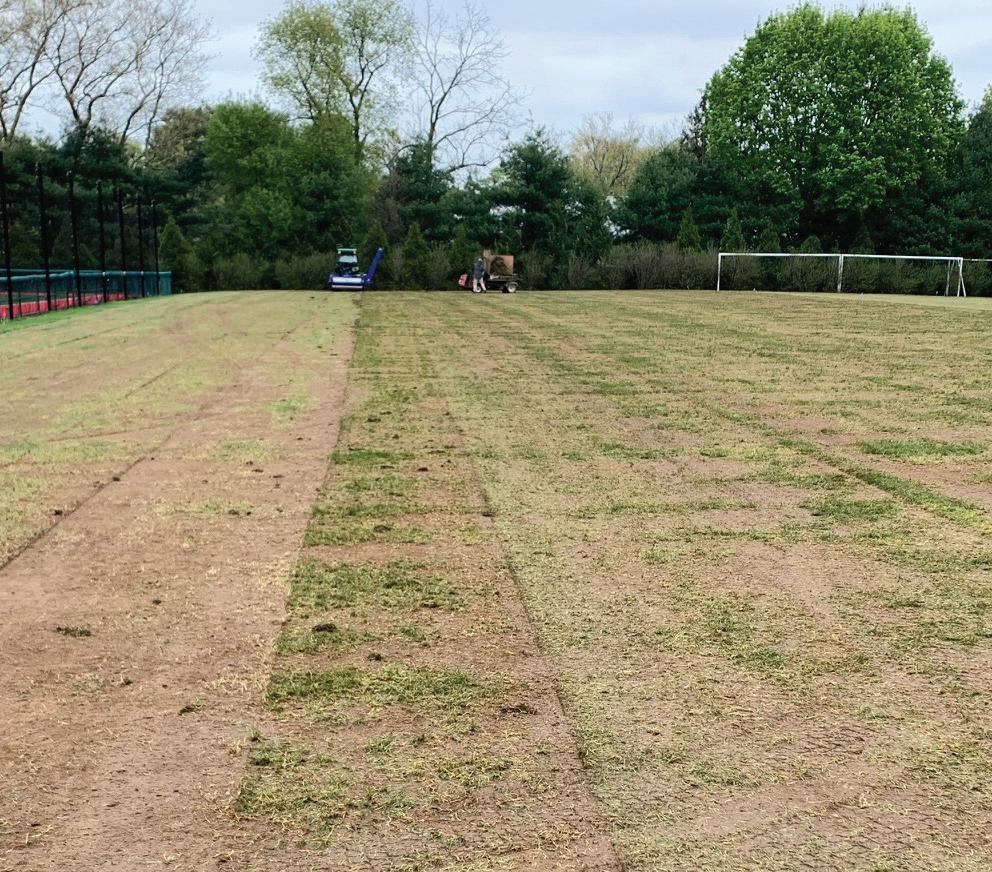
22 Professional Development: Cultivating an Environment of Growth
On the cover: Storied Fitton Field at College of the Holy Cross in Worcester, MA is considered to be the finest natural grass facility for viewing and playing a college football game in the Northeast. Photo Credit: Brendon Connor
Officers President
Chris McGinty
Framingham Parks Department
Framingham, MA
President Elect
6 President’s Message
8 NESTMA News
17 Index of Advertisers
Find this issue, Podcasts, Events and More: TheTurfZone.com
Advancing professionalism in sports turf management and athletic field safety through education, research, and scholarships.
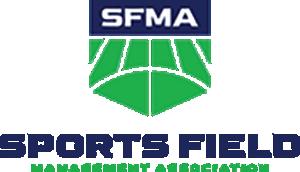
The official publication of the New England Sports Turf Managers Association (NESTMA), the New England Blade is dedicated to educating, advising, and informing members of the profession and furthering the goals of the Association. The New England Blade carries news and features related to the sports turf management profession. Publisher is not responsible for unsolicited material and reserves the right to edit any article or advertisement submitted for publication and to refuse advertising not in keeping with the goals of the Association. Publisher assumes no responsibility for the validity of claims in connection with items appearing in the New England Blade . Mention of a commercial product does not imply endorsement by the New England Blade, NESTMA, or Leading Edge Communications, or preference over similar products not mentioned. The New England Blade is published quarterly. Subscriptions are complimentary to members of NESTMA. Presorted standard postage is paid at Jefferson City, MO. Printed in the U.S.A. Advertising: For display and classified advertising rates and insertions, please contact Leading Edge Communications, LLC, 206 Bridge Street, Suite 200, Franklin, TN 37064, (615) 790-3718, Fax (615) 794-4524.
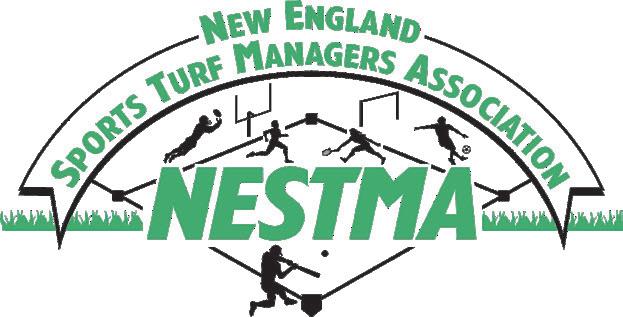
Art Goodhind Town of Natick Natick, MA
Treasurer
Andrew Carlisle, CGM
Worcester Technical High School Worcester, MA
Past President
Ben Polimer
Town of Weston Weston, MA
Directors
Tom Barry, CSFM
Greens Farms Academy Greens Farms, CT
Ryan Bjorn
Gillette Stadium
Foxboro, MA
Brendon Connor College of the Holy Cross
Worcester, MA
Adam Ferrucci
Read Custom Soils
Wareham, MA
Ian Lacy
Tom Irwin Advisors, Inc.
Burlington, MA
Scott Lagana Turf Products Corp.
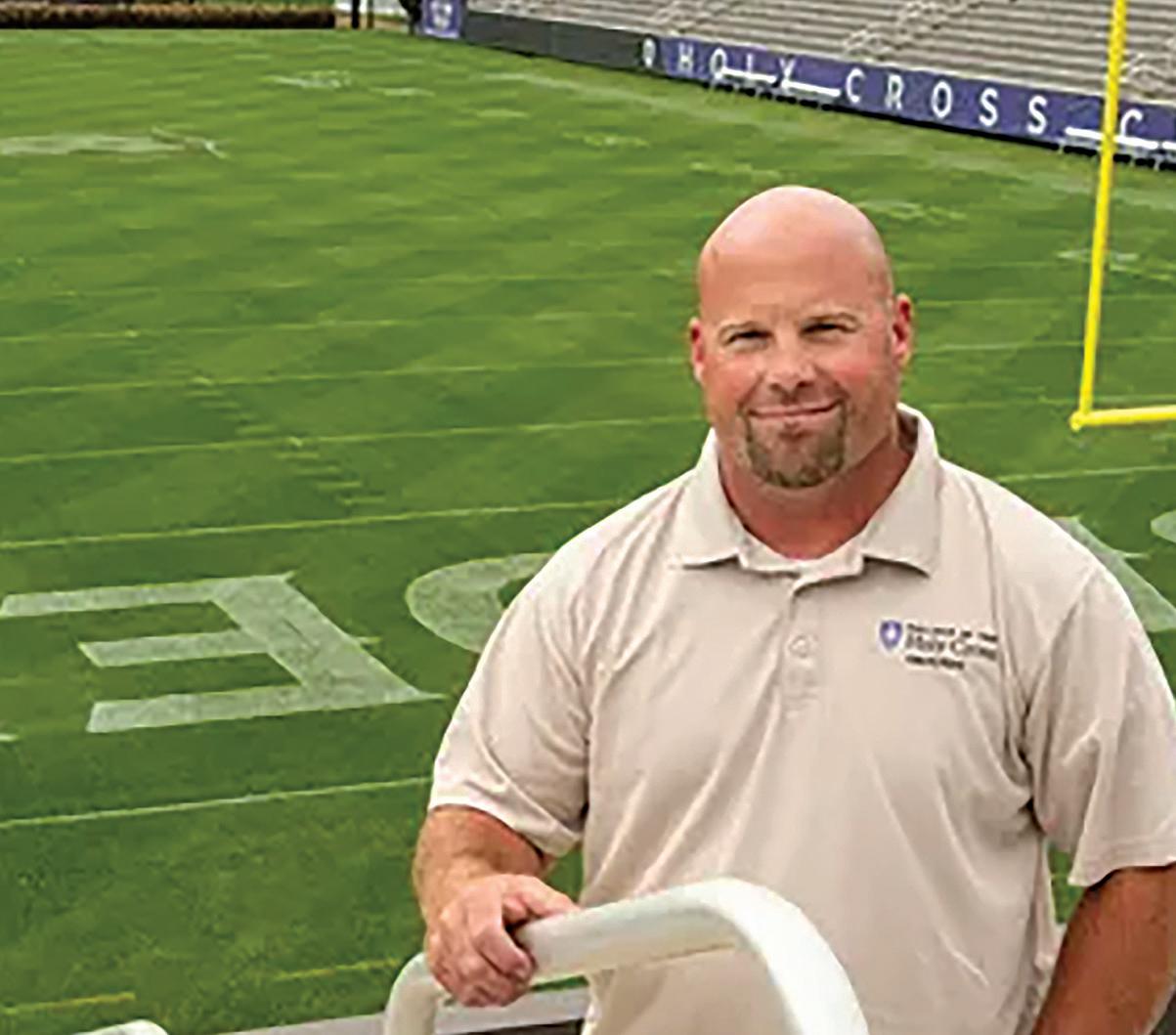
Holden, MA
Board of Trustees
Kim Britton
Saint Anselm College Manchester, NH
John Cunniff
Walpole, MA
Victoria Wallace University of Connecticut Storrs, CT
Management Team
Virginia Wood, Executive Director
Peggy Benjamin
Kristen Dreyer
Charissa Sharkey
NESTMA Headquarters
67 West Street Medfield, MA 02052
(508) 653-1241
NESTMA.org
NESTMAinfo@gmail.com
Technical Editor
Victoria Wallace
University of Connecticut Storrs, CT

Inmy career in sports field management, I had never experienced the weather ups and downs we have had this summer. Extreme heat, torrential rain and flooding, tornadoes – and we got off easy compared with other parts of the country.
We are experiencing changes in our climate. As turf professionals with a wide range of experience and expertise, we need to help our stakeholders manage what’s ahead. “No Mow May,” pesticide bans, noise and gas emission regulations, and synthetic turf restrictions throughout the region are a threat to the way we maintain our facilities. They are also an opportunity for us to put science, technology, and our knowledge to work in our communities.
It is time for us to adapt and adjust our perspective. Fraise mowing, sustainable practices, and battery powered equipment are the tip of the environmental protection iceberg.
Turf has a target on its back, and it is up to us to educate our constituents about the environmental benefits of natural grass fields. We need to demonstrate best practices in turf management and communicate how we are implementing these sciencebased strategies into our individual programs.
New England’s land grant university turfgrass faculty are a tremendous resource for current research and recommendations. I learned a lot at UMass’ Turf Research Field Day this summer and I’ve put what I learned into practice. I encourage you to reach out to your local turf grass faculty and researchers. I guarantee they want to hear from you.
Chris McGinty NESTMA President
Activitas – activitas.com
Arborjet – arborjet.com
Autmow – autmow.com
Covermaster – covermaster.com
Cub Cadet PRO Series – cubcadet.com
Finch Turf – finchinc.com
Five Star Golf Cars and Utility Vehicles – fivestargolfcars.com
Harrell’s LLC – www.harrells.com
Harts Turf Pro – hartsturfpro.com
Helena Agri Enterprises – helenaagri.com
Tom Irwin – tomirwin.com

MTE Equipment – mte.us.com
PJC Organic – www.pjcorganic.com
Precision Laboratories – twilliams@precisionlab.com
Progressive Turf Equipment – www.progressiveturfequip.com
R. A. D. Sports – radsports.com
Read Custom Soils – readcustomsoils.com
RePlay Maintenance USA – replaymaintenanceusa.com
Sports Construction Estimating – sportsce.com
STEC Equipment – www.stecequipment.com
Turf Products Corp. – turfproductscorp.com
Turf Robotics – turfroboticsllc.com
US Playground Surfacing – usplaygroundsurfacing.com

Thursday, October 5, 2023 MALCP / NESTMA Annual Golf Classic
Butter Brook Golf Club Westford, MA MALCP.org
Tuesday, December 5, 2023
5:00 p.m. – 8:00 p.m.
NESTMA Annual Meeting & Holiday Social
The German Club Walpole, MA NESTMA.org
January 22 – 25, 2024
SFMA Annual Conference & Exhibition
Ocean Center Daytona Beach Daytona Beach, FL Sportsfieldmanagement.org
March 5 - 7, 2024
New England Regional Turfgrass Conference
Rhode Island Convention Center Providence, RI NERTF.org
Wednesday, March 6, 2024 11:30 a.m. – 1:00 p.m.
NESTMA Awards Meeting & Lunch @ NERTC
Providence, RI
Do you know a NESTMA member who has made significant contributions to the sports turf industry in New England? Help us recognize their achievement with your nomination for Sports Turf Manager of the Year or Commercial Partner of the Year. Visit https://nestma.org/Awards-&-Scholarships for details and an online nomination form. Deadline is January 15, 2024. The awards will be presented at NESTMA’s Annual Awards Meeting and Lunch on March 6, 2024, at the NERTC in Providence, RI.
In 2023, NESTMA awarded $1000 scholarships to two young men studying sports turf management at UMass. Please help us spread the word that this scholarship (up to $1000) is available to a qualified student who is currently enrolled in a New England college/university and who is pursuing a career in the field of sports field management. The scholarship deadline is January 15. Application is available online at https://nestma.org/Awards-&-Scholarships.
It’s not too early to renew your NESTMA membership for the coming year! Renewals are quick and easy online at NESTMA.org/Renew24. Your continued financial support and involvement are important to our industry and appreciated by your association.
Have you ever thought about what it might be like to serve on a NESTMA committee or the board of directors? If you’d like to know more about what volunteer leadership entails, please contact any of our current board members or the NESTMA management team for details.
NESTMA’s education committee is eager to bring fresh perspective and ideas to the membership through our educational programming. Topics ranging from technical turfgrass management to leadership and communication have been suggested. Do you have educational information you’d like to present to NESTMA members? Outline your idea using this brief online form (NESTMA.org/education-form) and the committee will be in touch.
If you are a Commercial Partner interested in sponsoring NESTMA programs, please reach out to the Charissa ( NESTMAinfo@gmail.com ) at the NESTMA office and we’ll help you find the opportunity that gives your company the maximum ROI.


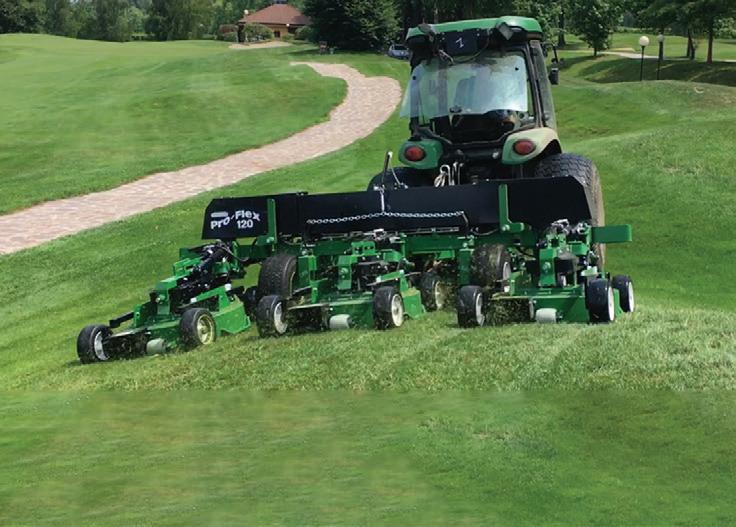
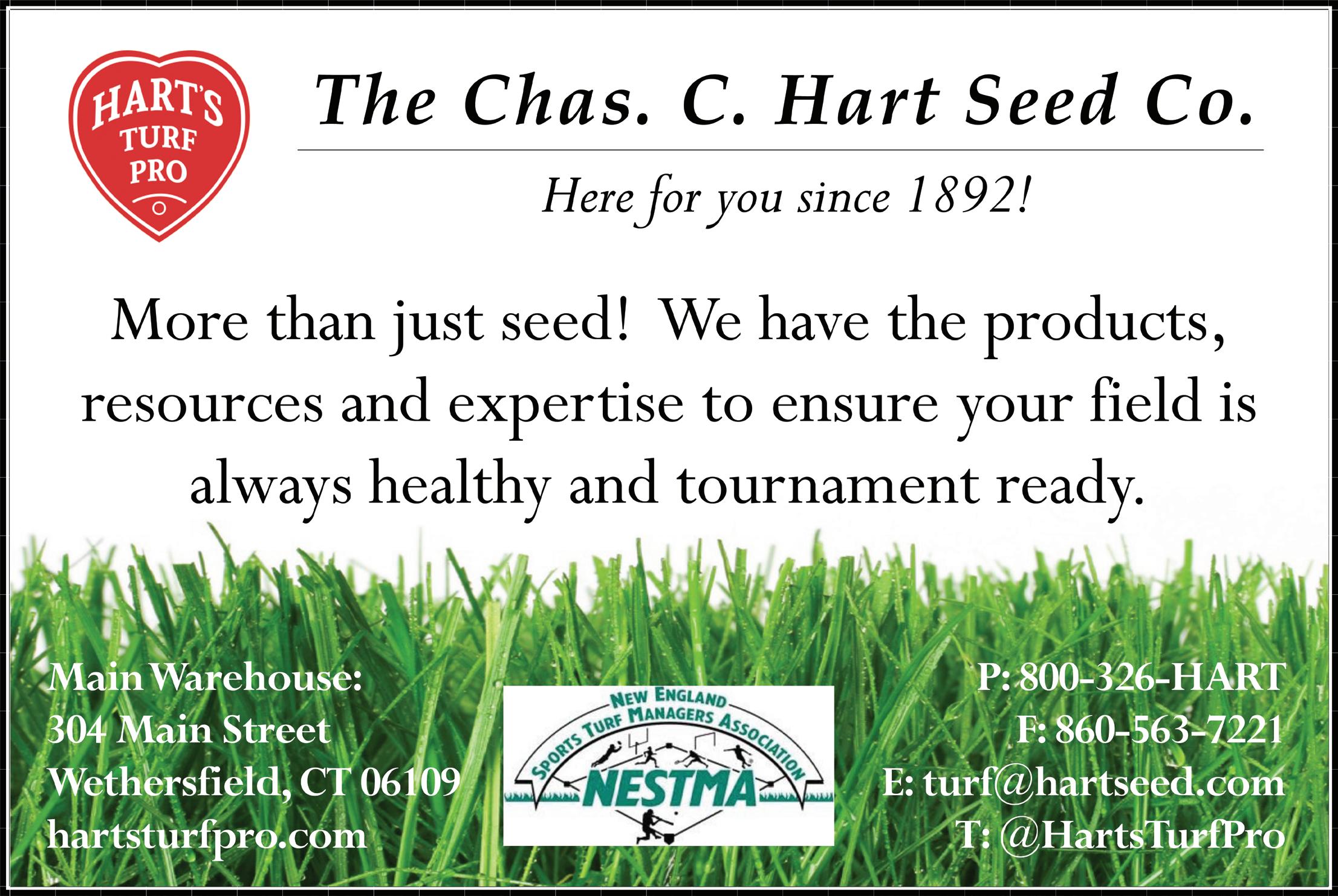
InMarch, a Task Group of hardworking sports turf professionals and academics led by Victoria Wallace at UConn, released a valuable new resource for our industry - “Best Management Practices for the Sports Field Manager: A Professional Guide for Environmental Sports Field Management in New England.”


This essential reference tool positions New England’s sports field managers as highly trained professionals who make decisions based on scientific fact and experience. Each chapter highlights sound agronomics and the steps involved with athletic field maintenance practices. There are also a series of local case studies on topics like water conservation, dealing with synthetic pesticide bans, fraise mowing for weed control, and more.
NESTMA’s BMPs for New England and case studies are available to current NESTMA members at no charge. Members are invited to visit NESTMA.org to download a digital copy. There are a limited number of printed copies available for $65 (includes shipping & handling). Please
Our
Quality Service and Products with Sound Agronomic Advice
Our experienced team is dedicated to providing sound agronomic advice, quality products and superior service. Our "It's About the Plant" approach helps to build strong, healthy and sustainable plants. Whether it is a golf green, soccer pitch, residential lawn or sod field, we are ready to help you to maximize your budget and achieve the full potential of your property and the property of your clients.
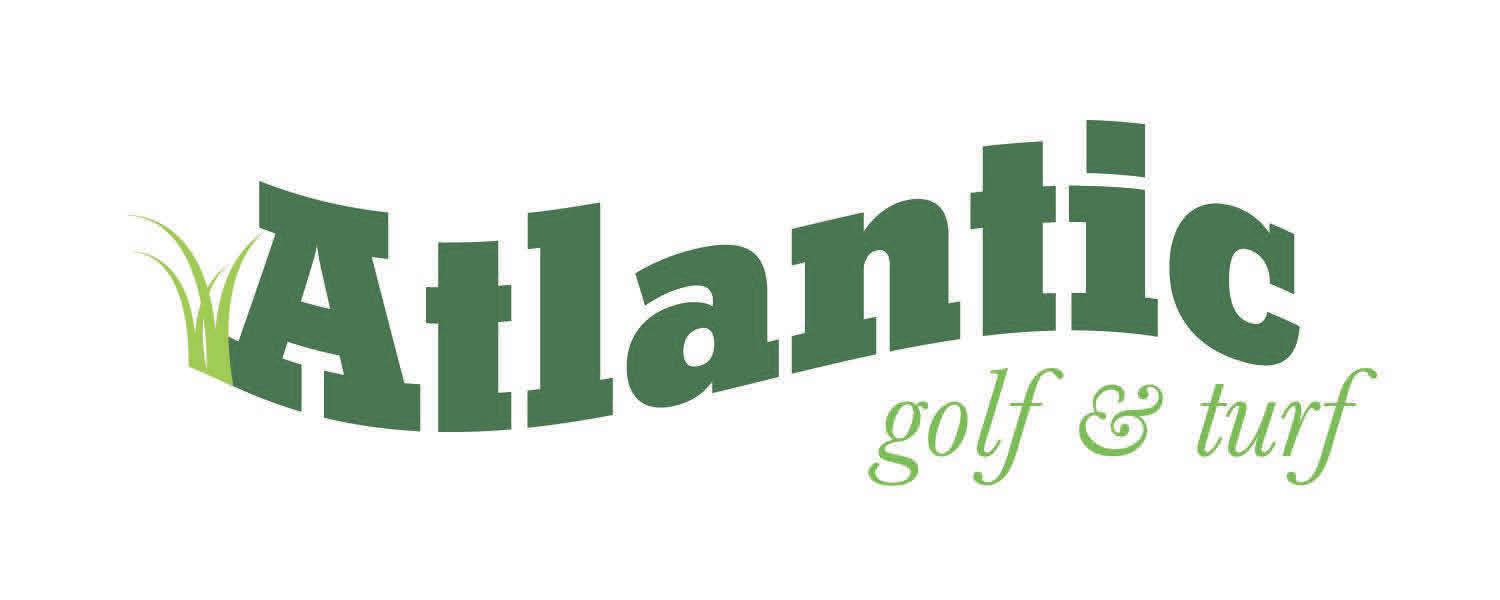
 Welcome to Atlantic Golf & Turf.
Roots Run Deep
Welcome to Atlantic Golf & Turf.
Roots Run Deep
Where did you go to school?
I began my turf career at Wachusett Country Club in West Boylston, MA during high school working under Donald and Matt Marrone. This is where my passion for turf began. After high school, I attended UMass Amherst, Stockbridge School of Agriculture majoring in Turfgrass Management. A few years later, I attended Worcester State College majoring in Business.
Where did you go from there?
After my first year at UMass, I completed my internship program at The International Golf Course in Bolton, MA under the guidance of Ron Melenski and Jim Whitley. During my short three years there, I learned a great deal about turf management and becoming a crew leader. After graduating from Stockbridge, I was fortunate enough to have the opportunity to be the Superintendent of Twin Springs, The Internationals’ ninehole public course in Bolton, MA. At the end of my third year, I decided to go back to school for my business degree at Worcester State College.
Who have been your sports turf mentors?
I have had the privilege of working alongside some of the best turf managers in the business and building a large network of colleagues. After my time at Wachusett Country Club and The International, I went to Wellesley Country Club as Assistant Superintendent under Bill Sansone. Bill taught me about the importance of proper cultural practices and the extreme importance of paying attention to detail. Scott MacIntosh is another mentor I look up to for support with different challenges we may face from sports events, and of course, Mother Nature.
What’s the best advice you’ve ever received?
One of the most useful pieces of advice I’ve received is not to be afraid to reach out and ask questions. Sometimes I feel like I don’t want to bother others during a busy workday so I may hesitate to reach out. NESTMA has been a great asset in expanding my network of friends and colleagues and this helps me feel more comfortable asking others their opinion on certain topics or experiences they may have dealt with in the past. Over the years, other colleagues have reached out to me on my thoughts, opinions, or experiences. I love trying to help others get better and solve problems. It makes our industry and friendships that much more valuable.
Is there a recent project that you have been able to complete / implement?
It’s been a few years, but we renovated the playing surface, soil profile and irrigation on our football stadium, Fitton Field. This project allowed us to enhance the profile making the field more of a sand-based field and convert it to a low mow bluegrass playing surface which has been an outstanding and safe field for our football team.
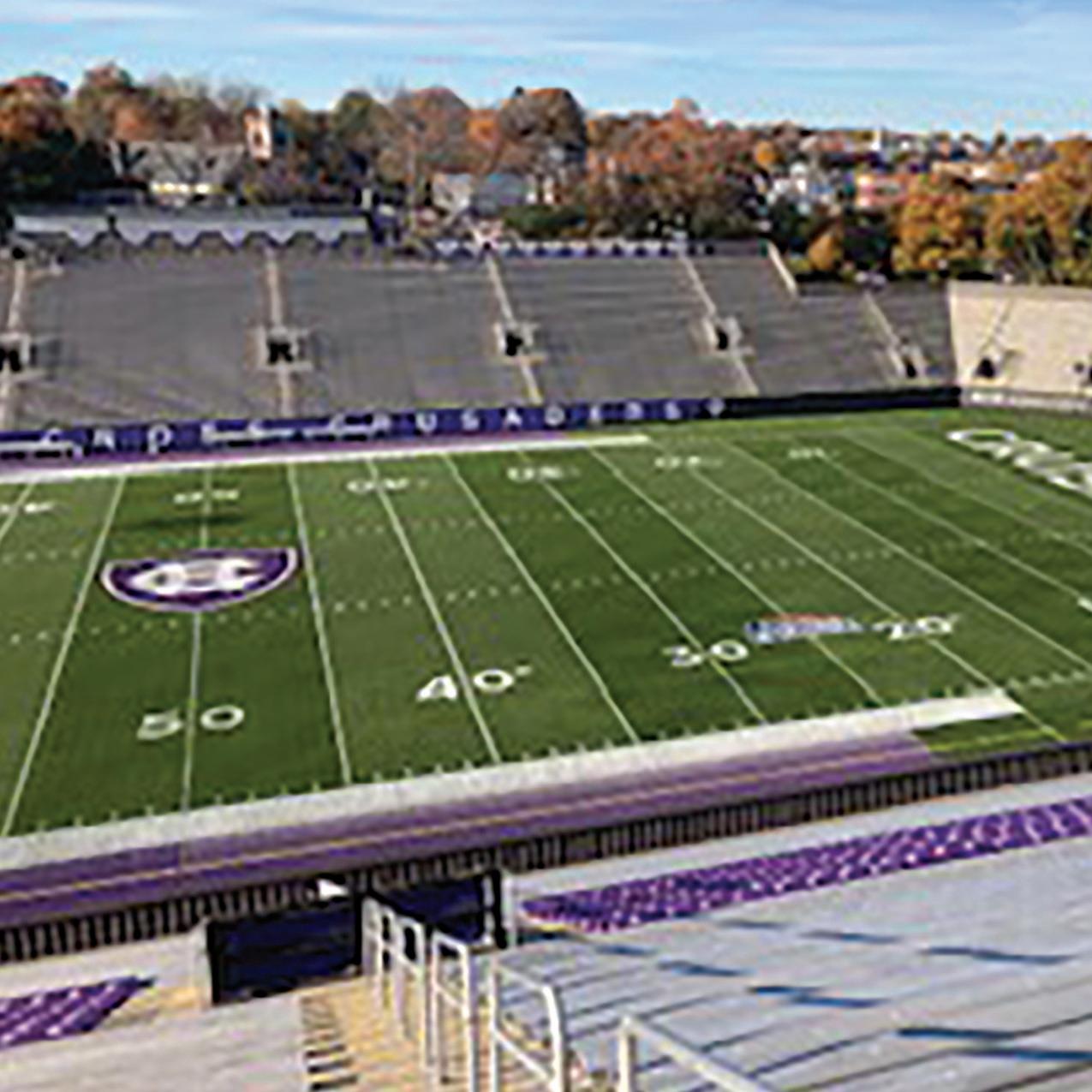
What is the next “game changer” you see on the horizon for the sports turf industry?
I’m sure it’s no surprise but autonomous mowers and paint machines are changing the way we do things. We are going into our third fall with our Turf Tank paint machine. Although we can’t completely walk away from it, the Turf Tank saves us a tremendous amount of time in man-hours with measuring and laying out fields. The precision and time savings are very beneficial to our overall operations. While the Turf Tank is operating, we can complete small tasks while it is running.
What is your favorite / most useful:
Equipment: Reel mower. Being able to keep turf cut with a sharp reel mower on our game fields makes our turf quality and density much better, reducing the need for chemical applications and helping our IPM program.
Product: Pac-Low Growth Regulator improves the quality, density, and health as well as suppressing Poa annua. Pac-Low also reduces clipping yield which reduces overall mowing time and fuel consumption.
Technology: Turf Tank saves time and improves quality and versatility between crew members. It’s relatively easy to train our crew on and to keep the same quality for our Division I sports events.

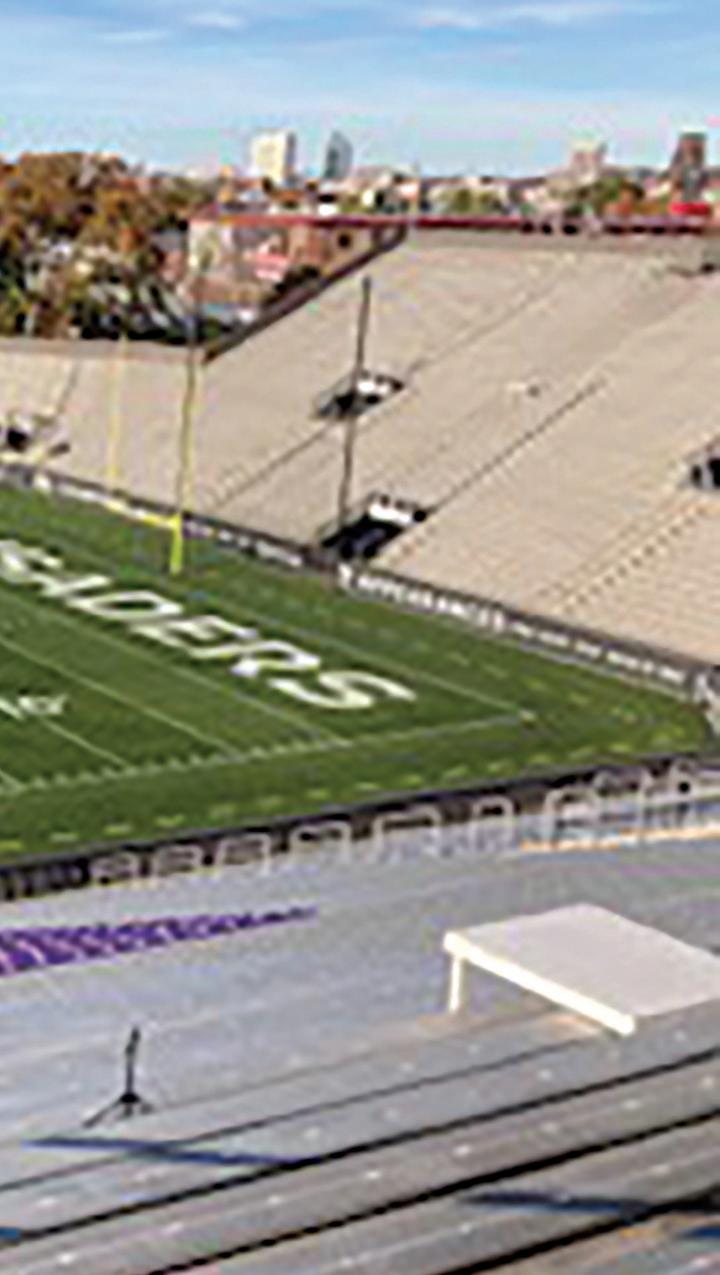
What advice would you share with people starting out in sports turf management today?
My advice to them would be to push yourself and never stop learning. Get involved, ask questions, go to seminars, webinars, conferences, take notes, read, and make sure to network with others in the industry. Don’t be afraid to ask questions. And, more importantly, make sure you listen to the answer, advice, or suggestions from others.
What have you enjoyed most / find most beneficial about being a NESTMA member?
Networking with others at events and conferences. I have met a lot of great people through NESTMA events along with great learning opportunities. The thing I love most about NESTMA is how everyone involved is so passionate about the industry and are always willing to help others become better.
Can you share a bit about your family and what you enjoy doing in your free time?
I have been married to my wonderful wife, Kim, for what will be 20 years in October. We have two beautiful daughters: Madelyn 14, who loves to dance and is an avid animal lover; and Isobel, 16, who plays travel softball year-round for her high school and loves to ski in the winter months. My wife Kim is an Occupational Therapist Assistant and works for the Summit PACE program through Fallon Health. As a family, we love to relax and vacation on Cape Cod and in York, Maine. When I am not working at Holy Cross as a sports turf manager, I have been a Call Firefighter in my hometown of Holden since 2009. If I’m lucky enough to have a little free time, I love to go fishing, both salt and fresh water. •

ESTMA was well represented at the UMass Turf Program’s Field Day on July 19 in South Deerfield, MA. Chris McGinty, President; Art Goodhind, Vice President; Andrew Carlisle, CGM, Treasurer; and many more members were on hand to support the program and let turf professionals know about the value of NESTMA membership.



The weather was spectacular as participants took guided tours of research projects in the field. A wide range of topics were covered including Turfgrass Selection for Better Winter Survival, Biology and Management of Pythium, Fungicide Combinations for Dollar Spot Control, and much more. UMass faculty were out in force answering questions; industry suppliers demonstrated the latest equipment; and turf professionals took advantage of the opportunity to network on a beautiful day. Thanks to the UMass
Turf Program faculty for their hard work and ongoing research contributions to our industry.
Many thanks to member volunteers who have tended the NESTMA table at many industry events this summer including VRPA Maintenance Workshop, UMass Turf Field Day, NEPA Summer Meeting, and CRPA Summer Meeting. We’ve enjoyed seeing our members, meeting prospective members, and supporting the sports turf industry in New England. •


Perennial ryegrass (Lolium perenne L.) is the predominant cool-season sports turf grass. It was originally introduced to the United States as an amenity grass, forage grass, and for soil erosion control, and we’ve been successfully using turf-types since their introduction in the 1960s. Although perennial ryegrass is revered in Europe, it is somewhat suffered in the United States, with some cool-season turf managers preferring to seed only Kentucky bluegrass (Poa pratensis), even if the chance of success is minimal. The distaste for perennial ryegrass as a sports turf grass has always perplexed me, since I know that most fields are already comprised of ryegrass, and I know just how great it can perform as a sports surface. It does have its challenges, but I believe its pros outweigh its cons. Let’s delve deeper in a point-counterpoint format:
Point: It is a bunch-type grass, and therefore does not have the capability to spread laterally.
Counterpoint: Ryegrass is a prolific producer of tillers and provides great sward density – particularly if mowed at the lower end of the preferred height of cut (1 – 2"). In studies conducted at Ohio State over many years, ryegrass has had recuperative potential as good as Kentucky bluegrass or tall fescue under traffic. In addition to its recuperative ability, it is very wear tolerant, and persists during heavy traffic.
Point: Because it is a bunch-type grass, fields must be constantly overseeded.
Counterpoint: There is no such thing as an athletic field that doesn’t need to be constantly overseeded, regardless of turf type. On native soils, where traffic and compaction are commonplace, all cool-season turfgrasses need regular overseeding to keep fields playable and safe.
Point: It is slippery.
Counterpoint: It is shiny on the underside of the leaf, which makes it look wet from a distance.
Point: It has poor heat, drought and cold tolerance.
Counterpoint: Like bluegrass and tall fescue, it is a cool-season grass, and so prefers air temperatures of 60 – 75° (15 – 24°C) and soil temps of 50 – 65°F (10 – 18°C). In extreme conditions, it may not be as heat and drought tolerant as tall fescue, or as cold tolerant as bluegrass, but it will survive in most areas.
Point: It is susceptible to grubs.
Counterpoint: Like many other turfgrasses, it is susceptible to grubs. However, many perennial ryegrass cultivars contain endophytes (microscopic fungi in the plant cells) that prevent attack from surface-feeding pests such as bluegrass billbugs, chinch bugs and sod webworms.
Point: It is difficult to mow in spring when flower stems are forming. This can result in poor mowing quality.
Counterpoint: Modern cultivars and sharp mower blades greatly reduce or eliminate this problem.
Point: In fall and spring, ryegrass does not mix well with other grasses. The color is different, and the clumps of ryegrass stand out.
Counterpoint: Ryegrass staying green longer into the fall/early winter and greening up quickly in spring is a major advantage for sports turf managers with fall or spring sports. Masking color differences can be achieved by applications of PGRs, iron or nitrogen fertilizers, choosing bluegrass cultivars with short winter dormancy, or spraying the field with a green dye in early spring. Some turf managers may also cover the field with a growth blanket, to promote uniform spring growth of all the grasses. In Europe, ryegrass cultivars are much lighter green, to mask the Poa annua that invariably encroaches on sports fields.
Point: Ryegrass takes over the field like a weed.
Counterpoint: The number-one reason it does so well is its ability to germinate and establish quickly. The ability to grow quickly means it can shade out the bluegrass and prevent seed germination and establishment. Athletic fields are not perennial stands of grass like lawns; they are in a constant state of renovation and, as such, the key to success is a quick establishing grass.
Point: Perennial ryegrass is susceptible to a whole host of turfgrass diseases.
Counterpoint: Yes, it is. No arguing on this point. If the conditions are favorable for a disease attack, ryegrass is prone to get it. Turf managers need to be extremely vigilant with summer applications of irrigation and nitrogen, and choose cultivars that have shown improved disease resistance. Where possible, especially on game fields, preventative applications of fungicide may be required. As a side note, however, because it is so quick to grow, it can sometimes survive a disease like damping off much more successfully than slower-growing species. •
This article originally appeared in the June 2023 issue of SportsField Management magazine.
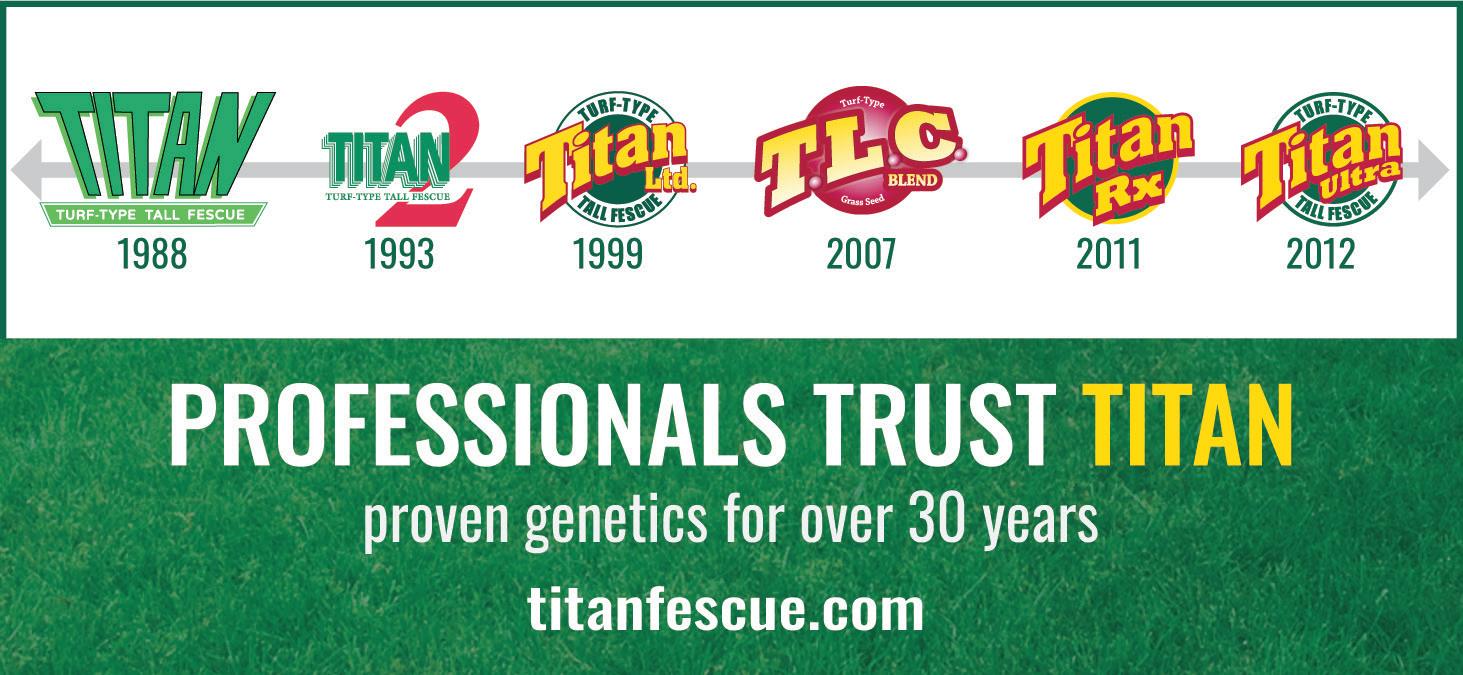
 Pamela Sherratt is sports turf extension specialist at The Ohio State University. Connect with Pam at sherratt.1@osu.edu
Pamela Sherratt is sports turf extension specialist at The Ohio State University. Connect with Pam at sherratt.1@osu.edu
Many schools are challenged to maintain safe, uniform, and healthy playing surfaces due to intense playing schedules and repeated traffic. Fraise mowing is a renovation practice that reinvigorates the turfgrass surface and can remove shallow-rooted weeds (Sitko and Rossi, 2019). Schools in towns or states that have banned pesticides on K-8 school grounds, such as in Connecticut, have had to readjust management practices. The use of fraise mowing can be an effective practice in an integrated weed management program for athletic fields, especially where herbicides are restricted or are not allowed.
Silt loam, overly compacted soils.
High weed contamination (70 – 80%) of annual bluegrass (Poa annua L.) and white clover (Trifolium repens) on a heavily trafficked multi-purpose (lacrosse, soccer, flag football) middle and high school athletic field at Greens Farms Academy.
• Eliminate a high percentage of the shallow-rooted weeds, including annual bluegrass and white clover.
• Keep the desirable populations of turfgrass species, perennial ryegrass (Lolium perenne) and Kentucky bluegrass (Poa pratensis) intact.
• Improve soil aeration and drainage.

• Have the field ready for use in late June / early July for summer lacrosse camps.
• Fraise mowing was performed on the field in mid-May after the conclusion of our spring sports season. We planned for the field to be out-of-play for six weeks to recover from the fraise mowing renovation process.
• The fraise mower was set to 1⁄2" depth to remove the majority of the shallow rooted weeds, including annual bluegrass and white clover, while keeping the deeper rooted and rhizomatous desirable grasses intact.
• Immediately after the fraise mow process, the field was solid-tine aerated with 3⁄4" tines, and overseeded with a combination of high-performing perennial ryegrass and Kentucky bluegrass cultivars to establish in the bare areas and to outcompete the germinating weeds.
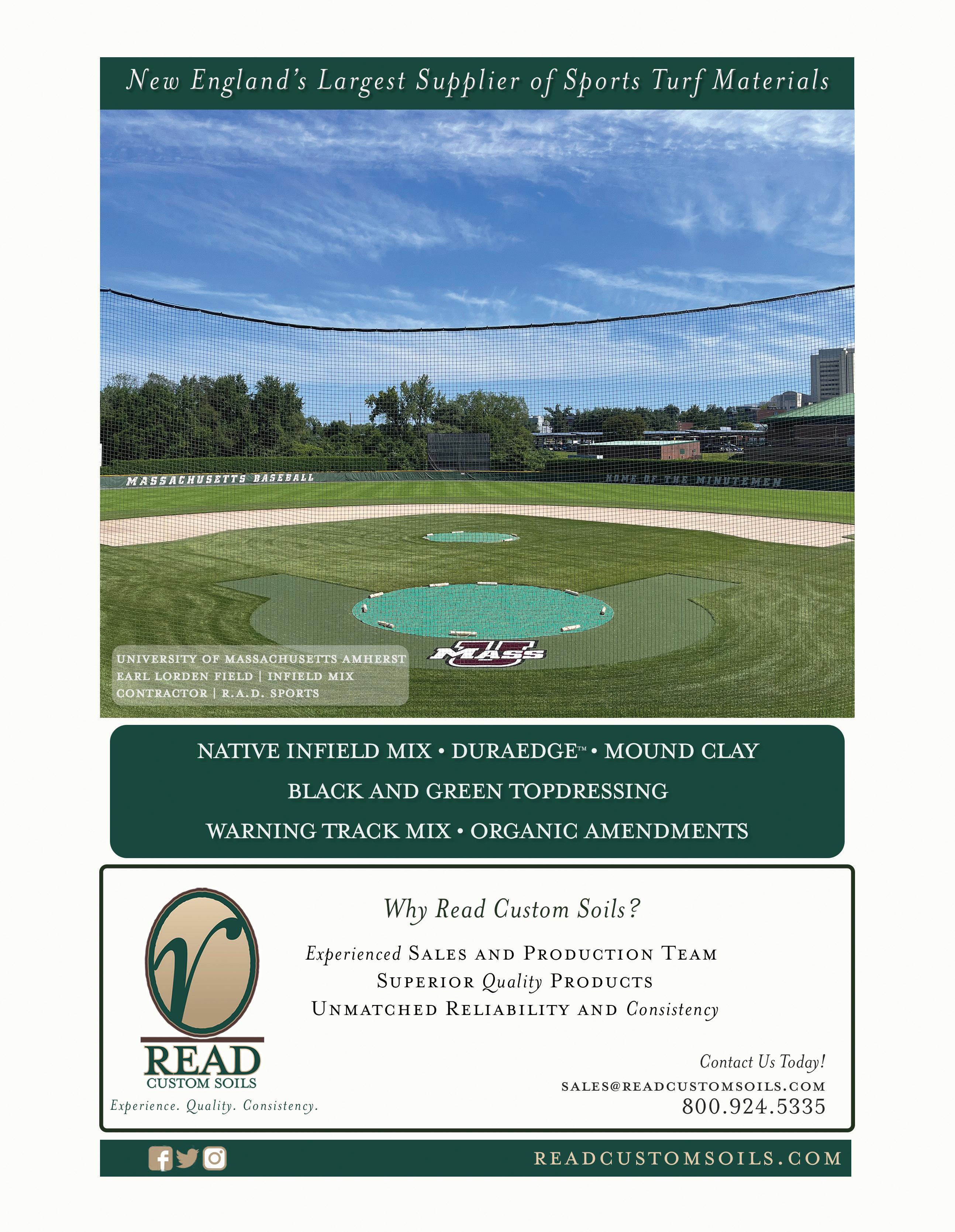
• We used a Redexim 1575 disc seeder in two directions with 2 lbs/1000ft2 of Kentucky bluegrass, broadcast perennial ryegrass at 3 lbs/1000ft2, and dragged seed into aeration holes.
• Our grow-in fertility program included a starter fertilizer and a poultry manure product at seeding. Every three weeks post-germination, we sprayed the field with a wetting agent, light N application, and biostimulants.
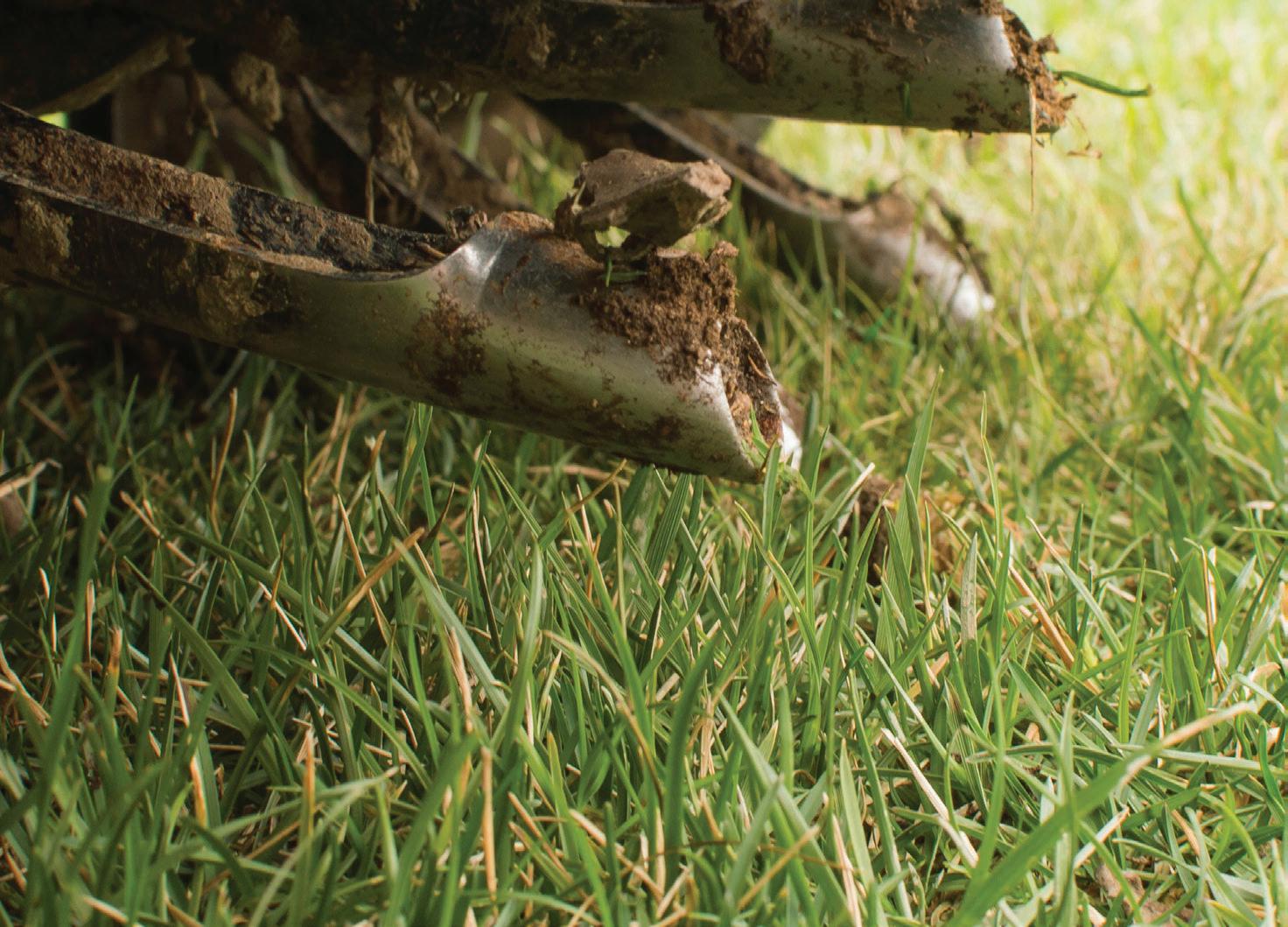
• Once the overseeding process was completed, we top-dressed with a coarse athletic field sand to help improve soil texture and surface levels of the field, including improved drainage and root development and penetration.

• The field was irrigated with light, frequent irrigation until germination of both species occurred. After germination, the irrigation schedule was reduced, and the duration of each irrigation event increased.


We had great success with reducing both annual bluegrass and white clover populations, but some annual bluegrass did recover (about 10 –15% following grow-in). We will continue to aerate and top-dress with sand to improve drainage and promote deeper rooted grasses. Clipping removal will be performed when annual bluegrass and clover are in flower. We will also look to fraise mow the field in the future (every three to five years).

The timing of an early spring fraise mow was not ideal, due to the lack of thatch development followed by intense summer annual grassy weed germination (e.g., crabgrass). Late summer-early fall is the best time to fraise mow, if an alternate field is available for sporting events.
Also, we should have increased the amount of sand used when we top-dressed to further improve drainage (basing fertility and other amendment decisions on soil test results). The additional sand would encourage deeper rooting of the desired turfgrasses grasses, while limiting the annual bluegrass and clover populations.
Fraise mowing should be considered as a tool for weed management. It can be a useful part of a comprehensive cultural program to control weed species, especially on pesticidefree athletic fields. •

Fraise mowing is an aggressive cultural practice that removes a thin layer of soil and organic matter from the playing surface (Henderson and Wallace, 2020). Fraise mowing machines can remove up to two inches of the turfgrass surface. It should be undertaken only under optimal turfgrass growing conditions. A fraise mowing event, in coordination with aggressive overseeding and consistent irrigation, can produce a uniform and dense playing surface within four to eight weeks. The field must be removed from activity during the renovation process/ grow-in while the field is recovering. Fraise mowing can only be considered if alternate field space is available.
Read more about fraise mowing at Benefits and Limitations of Fraise Mowing (sportsfieldmanagement.org). Henderson, Jason and Victoria Wallace. 2020. Best Management Practices for Pesticide-Free, Cool-Season Athletic Fields, Second Edition. UConn Extension. s.uconn.edu/uconnathleticfieldbmp
Sitko, C. and F. Rossi. 2019. Non-Chemical Weed Control in Amenity Grasslands via Fraise Mowing. Abstract. ASA Meeting
Funds to support creation of NESTMA BMPs and this case study, were provided by the New England Regional Turfgrass Foundation.


Everyone wants better employees and today, that usually requires growing them internally. By starting with a highpotential worker and developing them intentionally, companies are able to build a near-ideal employee ready to tackle their specific issues. But employee development only occurs in the right environment.
Employee growth is not unlike plant growth in that the result is dependent primarily on environmental factors rather than genetic make-up. Unfortunately, managers rarely audit their environment for employee growth potential and even fewer have clear ideas about the factors that would make a strong growth environment. Here are the seven environmental factors that should be considered when cultivating a culture of development:
Advanced Expertise – Employee growth can only occur when there is guidance from an experienced mentor who is setting the pace for production and sharing knowledge. Everyone should have a committed coach or mentor.
Continually Challenged – Advancing to the next professional level never happens by accident, so an environment where everyone is challenged to reach higher levels of performance creates the tension needed to advance intentionally.
Future-Oriented – A team which is focused on past mistakes doesn’t have the right outlook to grow their team. Growth is always the result of forward thinking where a better reality is a goal and positive intent around its achievement is embraced.
Affirming Atmosphere – Development takes a lot of extra work beyond simply the status quo so teams that encourage each other to the next level of their skills are the ones that usually stick it out to see the results. It is the consistency of effort over long periods of time that is enabled through encouragement and brings true results.
Mission Driven – When team members understand what their company does to enhance the lives of their customers and how their role contributes to making a difference, they are more likely to wake up excited and be driven to be the best version of themselves. This energy is essential to growth.
Failure is Embraced – When we learn new skills and put them into practice, failing is a large part of the learning journey. In fact, learned experience is the quickest way to actually know anything. But a negative reaction to mistakes will deplete growth momentum, so wise team leaders expect failures and embrace the opportunities they provide.
Mutual Advancement – People always work best when they’re working together, so teams where every member is growing are far more likely to see positive results. The best environments for growth have individualized and continuous development happening for every person and the culture is one of learning. •

If your team needs more help growing itself to the next level, or your want help building a better growth environment, check out the industry-specific resources available at www.GrowTheBench.com
NESTMA members are invited to connect with Neal at neal@growthebench.com





